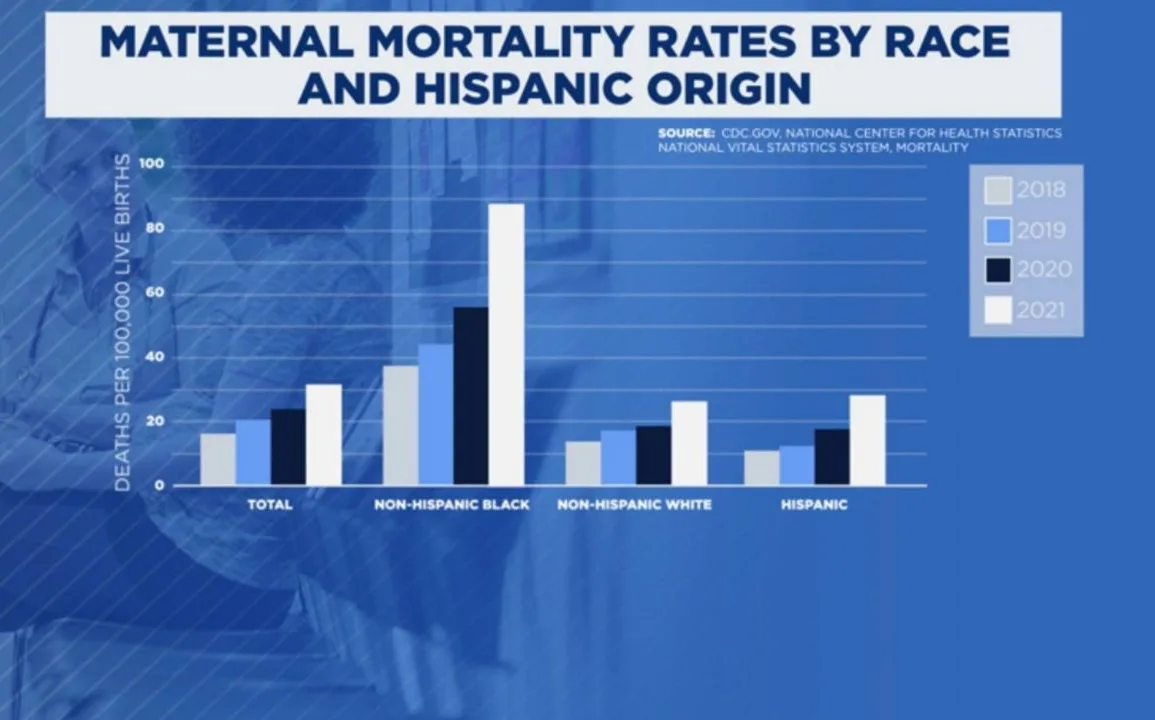TAMPA, Fla. — On Thursday, St. Petersburg Mayor Ken Welch issued a proclamation designating April 11 – 17 as Black Maternal Health Week in the city of St. Pete. He’s encouraging all residents to participate in Black maternal health events around Tampa Bay.
The city’s proclamation aligns with National Black Maternal Health Week, which also starts on April 11. The week started back in 2018 by the Black Mamas Matter alliance to raise awareness and help improve Black maternal health outcomes.
We’ve heard the difficult birthing stories from women like tennis star Serena Williams talking about how dangerous it was for her to give birth as a Black woman. It’s sparked a conversation that birthing experts say they’ve been emphasizing for years.
The Centers for Disease Control and Prevention (CDC) break down the numbers for maternal mortality rates by race and Hispanic origin. (Spectrum News)
Numbers from the CDC show how Black mothers are dying at higher rates, and those numbers continue to climb. One Bay area mother says, sadly, her daughter’s death is counted in those numbers.
Nicole Black picks up her smiling, energetic grandson, Jacob, from school. It’s the kind of thing grandmothers like Black dream of. It’s a dream documented in photo after photo.
Happy days, like the day her daughter, Crystale Galloway, or “Crissy,” as she calls her, gave birth to Jacob.
But in most of the photos from Jacob’s life, Galloway is missing.
“Her symptoms scared me. That day she came home from the hospital and I picked her up, I was a little nervous because she had the C-section and only stayed in a few days. Just her whole demeanor changed,” said Black.
Black said it started with troubling signs even before her daughter gave birth.
“She just all the time had complications,” she said. “She would break out in these rashes. But mainly, she had these headaches. She always had these headaches, and she was like, ‘Mom, I’m going to lay down, I have a headache,’ and I said, ‘Did you talk to your doctor about it?’ ‘Oh, he said just to take some Tylenol, he would prescribe something else but Medicaid can’t cover it.’”
The hours and days after her delivery changed their family’s lives forever.
“She came home that night. She came home, I got a call around two o’clock in the morning. I was asleep in bed. Everybody should be asleep. Basically, Jessica was on the phone telling me my daughter fell over the tub and spit was coming out of her mouth and she wasn’t moving,” said Black.
Black called 911. Hillsborough County Fire Rescue’s response to that call for help made headlines. A lawsuit settlement with the county details negligence. Black said paramedics refused to take Galloway to the hospital or check her vital signs and said that she “looked like she had too much to drink.”
“I had to make a conscious decision to keep arguing with all these government officials,” Black said. “Fire department, Hillsborough County Sheriff — I had to make a conscious decision to keep standing there arguing with them while they weren’t taking vitals, while they weren’t trying to assist her, or I had to get her to the hospital. I literally begged them for five minutes to help me get her down the stairs.”
Black ended up driving her daughter to the hospital on July 4, 2018, where she died from a brain aneurysm five days later — 12 days after giving birth to Jacob.
“I remember being hurt. And I remember wanting to lash out. You know when you lose somebody close, it’s all good to say, ‘I’m sorry for your loss, I’m sorry for your loss.’ But when I tell you, ‘I’m sorry for your loss,’ I tell you why,” she said.
Her daughter’s death changed her life. Black found herself raising Galloway’s three children and said she still struggles when she sees a pregnant woman.
“When I’m at work and see a pregnant girl, I’m nervous,” she said. “When they get ready to have a baby, I (pray) for them. I’m concerned.”
Black said she never wants to see another grandmother’s “dream” turn into a nightmarish loss like hers.
According to the Florida Department of Health, Black women in the state are four times more likely to have a pregnancy-related death when they are compared to white women. The causes vary, among them, researchers say it can be a lack of access to health care, inadequate care, or racism.
Experts and advocates are working to reduce those numbers.
The University of South Florida’s College of Public Health is kicking off their weeklong Black Maternal Health Week events. The first event is called “Girl Talk.”
The City of St. Pete’s proclamation of Black Maternal Health Week. (Photo Courtesy: The City of St. Petersburg)


